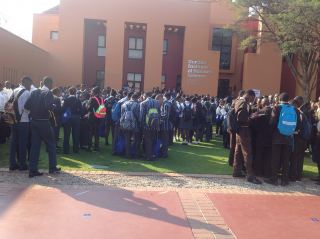MathsGee Unveils New EdTech Revenue Model
2020 saw the sharpest rise in digital transformation across the globe. The pandemic accelerated the introduction of online education workflows in an unprecedented fashion. The effects of the crisis-induced change in teaching and learning are permanent.
“When the worldwide lockdowns started, every school was scrambling to see how they can deliver value and ensure learning continuity during this terrible time. The crisis exposed the technology access gap between the poor and rich in many societies”, stated Edzai Zvobwo, the Founder and CEO of MathsGee a peer to peer learning platform for learners to help each other through subject-specific questions and answers.
Online learner support platforms like MathsGee, Brainly and Byjus among others saw experienced exponential growth as learners and teachers were scrambling for scalable solutions to help them weather the “learn from home” phenomenon.
The common feature among platforms that gained the most users during this period is the availability of free content. This inclusive approach to business enabled learners from all walks of life to have access to quality educational resources at no cost.
This trend is evidence that there is a need for new and innovative business models that serve all learners regardless of their economic situation.
One prevalent business model that has enabled inclusivity is the ads-based model whereby learners can consume all the content but are exposed to advertising from third parties.
Another model that has grown is the freemium model whereby learners have access to basic content or free trials for a given period and then to access more features they have to pay a monthly or annual subscription fee.
“The freemium model is half-good because it gives you access but not full access thereby depriving learners of the quality information behind the paywall, this is exclusivity”, said Zvobwo.
MathsGee is committed to providing tools that enhance learner outcomes regardless of extenuating circumstances like poverty thus it has maintained a “full buffet” model. The EdTech startup currently uses an ad-based model to get revenue but is in the process of phasing out this method. They now have a “Sponsor/Tip-jar” model that seeks to optimize information sharing among learners and tutors on the platform.
In line with trends in the open-source world, which have seen the emergence of companies such as Patreon, who facilitate for the payment of creators by fans. This is a new model that allows for fans to give back to creators who are freely adding value in their lives. Github, Reddit, Pixabay and many other open-source platform now have a “Sponsor” button.
MathsGee has decided to make peer to peer sponsorships and donations the main revenue model for both the platform and content creators. Every user has a unique link on their profile that allows for other users and visitors to donate to them. The platform gets a 10% commission inclusive of transaction charges from the payment gateways.
This model ensures that no content is hidden from anyone and if a creator is producing quality content, they are guaranteed to be supported by beneficiaries on a willing donor basis.It is vital that education tool providers continue innovating for the benefit of the learner.
Website: https://mathsgee.com
Example Profile and Donate Button: https://mathsgee.com/user/MathsGee
MGLI launches online course exchange
Johannesburg – April 9, 2017– MathsGenius Leadership Institute (MGLI) is pleased to announce that it has launched Diretsa, https://www.diretsa.com a crowd-sourced course marketplace for 21st century skills in order to meaningfully contribute to the skills development goals as set out by United Nations and the African Union.
The platform intends to lower the barrier of entry into knowledge creation sharing and acquisition thus has been structured in such a way that every user will be able to create their own customized website and share knowledge with the world. As a global education marketplace, Diretsa is focused on securing partnerships with top educators from around the world in order to provide African learners with access to leading educational programs and information. The call for content publishers is not limited to top professors but is open to anyone who feels they have a skill to share with the world. Most African countries are suffering from infrastructure deficits and this is directly impacting learning for the continent that has the highest youth ratio in the world. It is exciting for Diretsa to be a strategic partner to content publishers and consumers and hopefully it will have the intended impact.
Diretsa has begun to drive awareness of the MGLI’s vision to democratize education for emerging markets by engaging various stakeholders in the African continent. Diretsa also looks to be a sponsor one of Africa’s largest education conferences, EduWeek that brings together educational movers and shakers from around the world to Africa. To educate the people in developing countries, they require access to global educators’ programs and this conference is a massive opportunity to network and exchange value.
Anticipated strategic partnerships with various leading institutions in the USA and venture capitalists will further bolster Diretsa’s ability to add value in Africa’s education ecosystem as the platform of choice. By bridging the access gap, Diretsa is solving a huge problem and helping developing countries achieve their objectives to skill up the African continent. Educators from around the world and learners across Africa can come together on one platform”, says Edzai Zvobwo, Chief Genius at MathsGenius Leadership Institute (MGLI).
MathsGenius launches "Mothers For STEM" Initiative
MathsGenius Leadership Institute (MGLI), a quantitative leadership startup based in Johannesburg, South Africa has launched an audacious program entitled "The Mothers for STEM Initiative".This initiative seeks to empower 150 women with STEM (Science, Technology, Engineering and Mathematics) tutoring businesses by the end of 2017.
South African learners perennially do badly in maths and science subjects compared to their peers in other countries as shown by the low ranking in both the TIMSS and WEF reports on educational quality. On this background, MathsGenius a STEM advisory start-up saw it fit to address some of the fundamental problems associated with this failure in STEM.
A study done by MGLI in 2014 showed that the weakest link in the maths and science education learner spectrum were rural and township girls. They are the one who were seen to pose the greatest threat to success of the country in STEM subjects and careers. Upon further analysis a strong correlation between a mother's belief system around maths and science and their daughter's performance was established.
"The best way to get more girls into STEM is to involve the community especially the mothers", stated Edzai Zvobwo, Chief Genius at MGLI. To put these sentiments into practice, MGLI has embarked on an ambitious project to provide motivation, training and support to 150 mothers who will become STEM tutoring business owners within their communities.
MGLI is looking for willing partners to come into fray and contribute towards the achievement of this goal. The model will see MGLI setting up an online education ERP system and LMS that will allow continuous monitoring of the entrepreneurs and learners and measuring progress and impact as the project goes on. MGLI will provide the prospective entrepreneurs with a "school-in-a-box" solution that they can simply plug and play to the benefit of learners.
For information on this initiative you can visit Mothers of STEM or send an email to This email address is being protected from spambots. You need JavaScript enabled to view it.




